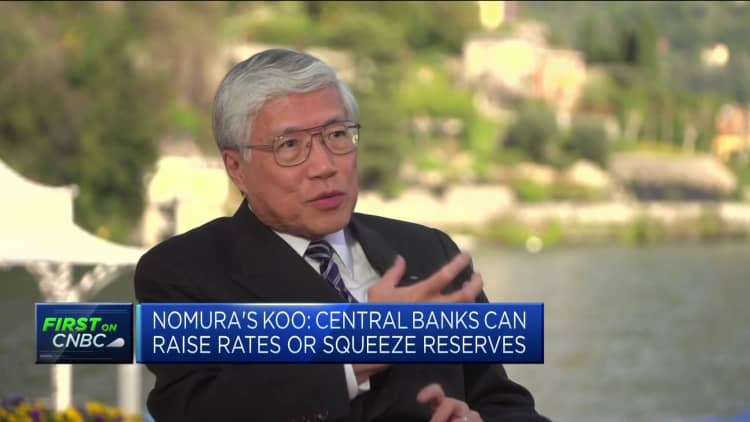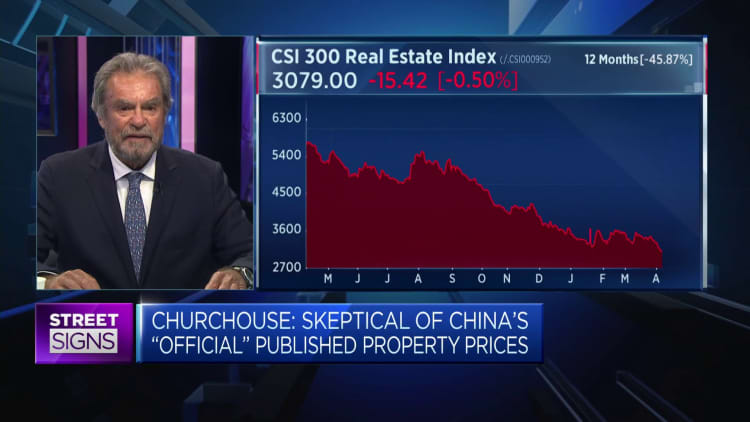[ad_1]
Pictured here’s a actual property undertaking below building in Huai ‘an metropolis, Jiangsu province, China, on April 8, 2024.
Future Publishing | Future Publishing | Getty Pictures
BEIJING — China must persuade those who dwelling costs are on their manner up to ensure that financial exercise to choose up, Richard Koo, chief economist at Nomura Analysis Institute, advised CNBC’s Steve Sedgwick final week.
Enterprise and shopper urge for food for brand spanking new loans have had a tepid begin to the yr, whereas dwelling costs dropped at a steeper tempo in January than in February, in accordance with Goldman Sachs’ evaluation.
In different phrases, as Koo warned final yr, China could also be coming into a “steadiness sheet recession,” much like what Japan skilled throughout its financial hunch.
“For them to return again and borrow cash, we’d like a story that claims, okay, that is the underside of the costs, the costs will begin going up from this level onwards,” Koo mentioned.
However it’s not clear whether or not costs have reached an precise backside but. Koo and different analysts have identified that in China’s policy-driven financial system, home costs haven’t fallen as a lot as anticipated given declines in different points of the property market.

Chinese language officers have mentioned that actual property stays in a interval of “adjustment.” The nation has additionally been emphasizing new progress drivers corresponding to manufacturing and new power autos.
Actual property and associated sectors have accounted for a minimum of one-fifth of China’s financial system, relying on analyst estimates. The property market started its newest hunch after Beijing cracked down on builders’ excessive reliance on debt in 2020.
That coincided with the shock from the Covid-19 pandemic.
It additionally comes as China’s inhabitants has began to shrink, Koo identified — an enormous distinction with Japan, whose inhabitants did not begin to fall till 2009, he mentioned.
“That makes this narrative, that the costs have fallen sufficient, it’s best to exit and borrow and purchase homes, much more troublesome to justify as a result of [the] inhabitants is now shrinking,” Koo mentioned.
Classes from historical past
China’s financial system formally grew by 5.2% in 2023, the primary yr because the finish of Covid-19 controls. Beijing has set a goal of round 5% progress for 2024.
Nevertheless, many analysts have mentioned such a aim is bold with out extra stimulus.
Chinese language authorities have been reluctant to embark on large-scale help for the financial system. Koo mentioned an underlying purpose is that Beijing views its prior stimulus program as a mistake.
About 15 years in the past, within the wake of the worldwide monetary disaster, China launched a 4 trillion yuan ($563.38 billion) stimulus package deal that was initially met with skepticism — and a 70% drop in Chinese language inventory costs, Koo mentioned.
“It was heading towards steadiness sheet recession, nearly,” he mentioned. “One yr later, China had 12% progress.”

However Beijing saved up its stimulus package deal even after the nation had achieved fast progress, which led to an overheating of progress and hypothesis, on high of corruption, Koo mentioned. “That is one of many the reason why this authorities, Mr. Xi Jinping, remains to be reluctant to place [out] a big package deal as a result of so many individuals suppose the earlier one was a failure.”
Wanting forward, Koo mentioned China ought to stimulate its financial system to keep away from a steadiness sheet recession, and that it ought to lower that help as soon as progress reaches 12%. “As soon as the borrow[ing] is coming again, then you may lower, however not earlier than.”
[ad_2]
Source link





